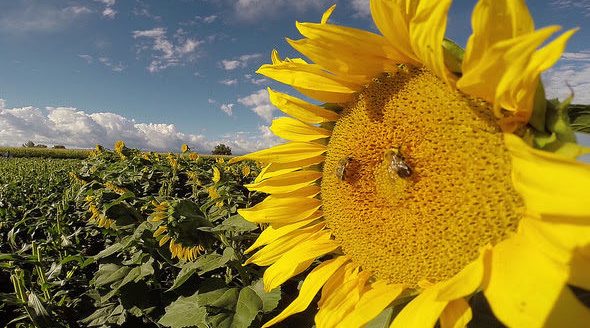Artificial intelligence in agriculture isn’t the future; it’s now

Cengiz Koparan knows first-hand the need for agricultural technology.
Koparan planted 1,000 apple trees in Ankara, Turkey, in 2004. The demanding work of planting, maintaining and harvesting the apples in his orchard helped inspire his mission to put advanced robotics in the hands of more farmers.
Koparan, a new assistant professor of precision agriculture technology for the University of Arkansas and the University of Arkansas System Division of Agriculture, said the rapid rise of artificial intelligence is already making cutting-edge technology more available.
“It’s no longer a future,” Koparan said about automating agricultural systems and technology. “Fifteen years ago it was the future, but now it’s here.”
Koparan’s research aims to improve agricultural practices through robotic systems. Part of his research involves using artificial intelligence to reduce labor shortages and make farm technology more approachable for producers.
Koparan said that as technologies become more complex, artificial intelligence could make them more user-friendly.
“Someone needs to form a bridge between engineering applications and the operators,” Koparan said. “AI can fill some of this gap. If a machine or robot is based on artificial intelligence, then the end user won’t have to control all aspects and parameters of the robot.”
Researchers with the Arkansas Agricultural Experiment Station, the research arm of the Division of Agriculture, are already investigating numerous applications of artificial intelligence and machine learning. Experiment station scientists are evaluating new weed control technologies, designing systems to determine yield potential from aerial imagery and studying the use of artificial intelligence and robotics in chicken processing.
Encouraging student involvement
Koparan joined the University of Arkansas System in February. He has a dual role, working for both the Dale Bumpers College of Agricultural, Food and Life Sciences and the College of Engineering. He is in the department of agricultural education, communications and technology in the former, and the department of biological and agricultural engineering in the latter.
Since arriving in Arkansas, Koparan has established an agricultural robotics club at the university and received a $5,000 Student Success Grant from the university’s Global Campus. The grant will fund a reoccurring capstone project course beginning in spring 2024. Throughout the course, Koparan will instruct students on how to build a quadcopter and subsystems for site-specific precision agriculture applications.
Koparan said his knowledge of engineering concepts combined with his awareness of agricultural practices allow him to explore possible solutions to issues in the industry.
“When you know how and you know there is a need, you do it,” Koparan said.



